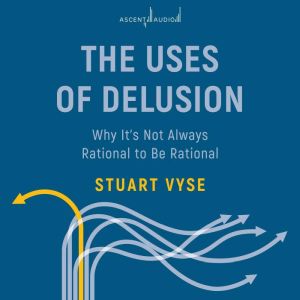

The Uses of Delusion
Why It's Not Always Rational to Be Rational
Author: Stuart Vyse
Narrator: Joel Richards
Unabridged: 7 hr 43 min
Format: Digital Audiobook Download
Publisher: Ascent Audio
Published: 05/02/2022
Categories: Nonfiction, Psychology, Personality
Synopsis
The Uses of Delusion is about aspects of human nature that are not altogether rational but, nonetheless, help us achieve our social and personal goals. Psychologist Stuart Vyse presents a lively, accessible exploration of the psychological concepts behind "useful delusions," fleshing out how delusional thinking may play a role in love and relationships, illness and loss, and personality and behavior. Along the way Vyse draws on the work of William James, Daniel Kahneman, and Joan Didion—who wrote about her compelling belief that her husband, though deceased, would soon return to her.
Throughout, Vyse strives to answer the question: why would some of our most illogical beliefs be as helpful as they are? The concluding chapter offers an explanation grounded in natural selection—the ability to fool ourselves, Vyse argues, has actually helped us to survive. In the last section of The Uses of Delusion, Vyse offers suggestions for determining when reason should rule and when intuition and emotion should be allowed to take over.

